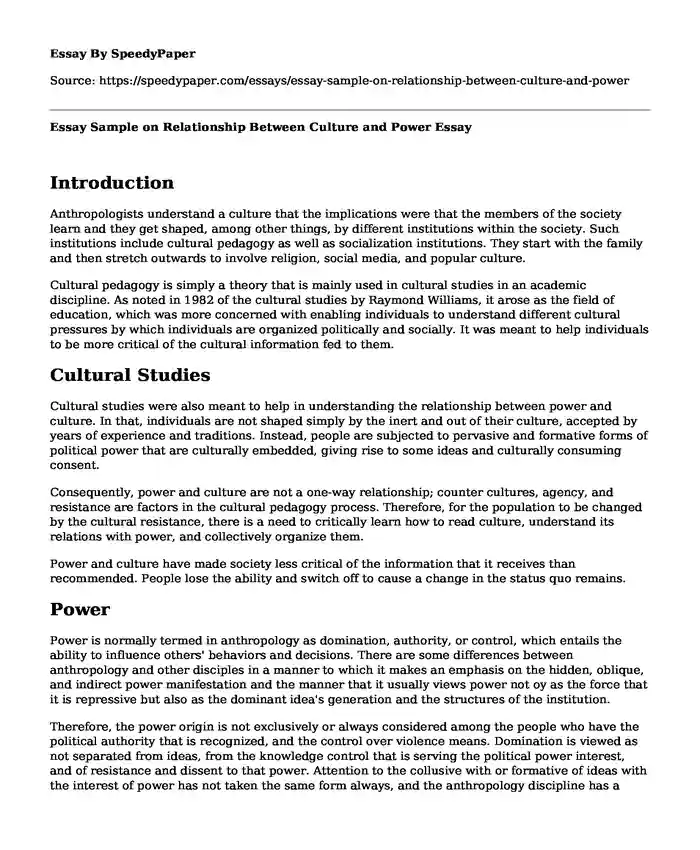
| Type of paper: | Essay |
| Categories: | Culture Anthropology |
| Pages: | 3 |
| Wordcount: | 795 words |
Introduction
Anthropologists understand a culture that the implications were that the members of the society learn and they get shaped, among other things, by different institutions within the society. Such institutions include cultural pedagogy as well as socialization institutions. They start with the family and then stretch outwards to involve religion, social media, and popular culture.
Cultural pedagogy is simply a theory that is mainly used in cultural studies in an academic discipline. As noted in 1982 of the cultural studies by Raymond Williams, it arose as the field of education, which was more concerned with enabling individuals to understand different cultural pressures by which individuals are organized politically and socially. It was meant to help individuals to be more critical of the cultural information fed to them.
Cultural Studies
Cultural studies were also meant to help in understanding the relationship between power and culture. In that, individuals are not shaped simply by the inert and out of their culture, accepted by years of experience and traditions. Instead, people are subjected to pervasive and formative forms of political power that are culturally embedded, giving rise to some ideas and culturally consuming consent.
Consequently, power and culture are not a one-way relationship; counter cultures, agency, and resistance are factors in the cultural pedagogy process. Therefore, for the population to be changed by the cultural resistance, there is a need to critically learn how to read culture, understand its relations with power, and collectively organize them.
Power and culture have made society less critical of the information that it receives than recommended. People lose the ability and switch off to cause a change in the status quo remains.
Power
Power is normally termed in anthropology as domination, authority, or control, which entails the ability to influence others' behaviors and decisions. There are some differences between anthropology and other disciples in a manner to which it makes an emphasis on the hidden, oblique, and indirect power manifestation and the manner that it usually views power not oy as the force that it is repressive but also as the dominant idea's generation and the structures of the institution.
Therefore, the power origin is not exclusively or always considered among the people who have the political authority that is recognized, and the control over violence means. Domination is viewed as not separated from ideas, from the knowledge control that is serving the political power interest, and of resistance and dissent to that power. Attention to the collusive with or formative of ideas with the interest of power has not taken the same form always, and the anthropology discipline has a history of ideas that is very rich and are associated with the power concept. Considering the ethnographies that were produced in the settler states or colonial regimes context, with their problem emphasis that is descriptive in the lack of presumed law and bureaucracy, anthropology took a considerable amount of position of criticizing the postcolonial which entails shifting towards hidden in plain or inscrutable analyses of the power sight source.
According to Bourdieu, power can also be understood to go hand in hand with the hegemony concept, as contributed through everyday practice and language. The practices and symbols of culture cover the social distinction and offer service to shape power hierarchies. The culture acts as the capital form, which is a small good issued to individuals who are willing to concentrate.
Power is an integral element of culture; thus, power and culture are related to one another inextricably, making it hard to distinguish. Power is obtained through the culture, being retained through the culture, and kept through the culture, and power can even be transferred to others through culture. For instance, wealth and money power, knowledge power, spiritual power, and political power, all the authority are transferred through values which are established culturally. The democratic q political power is managed and achieved through the mandate of the people's democracy; then it is only valid. The same applies to the knowledge power of any knowledge branch obtained through the educational institutions that are established culturally. It will only be identified and valued professionally.
Power forms part of the culture, and there is a presence of strong integrated and interconnected relationships with culture. Power is usually established or legalized or validated through the available culture. For instance, in most Middle Eastern countries, democracy is lacking; therefore, the available power mode is justified or validated by the culture. The countries' subject is infused with the power mode established by their culture.
Conclusion
Therefore, different views are nurtured of what is meaningful and desirable concerning power. By putting up the horizontal or vertical differences caged within the wider classification of collectivism or individualism, demonstrating that culture offers a prediction on the distinct concepts of power.
Cite this page
Essay Sample on Relationship Between Culture and Power. (2024, Jan 11). Retrieved from https://speedypaper.com/essays/essay-sample-on-relationship-between-culture-and-power
Request Removal
If you are the original author of this essay and no longer wish to have it published on the SpeedyPaper website, please click below to request its removal:
- Free Essay on the Skills Required for Effective Communication for Multicultural Background
- Essay Sample: Environment Ethical Theories
- Paper Example. Total Reward Strategies
- Paper Example. Safe Harbor Agreement
- Ninhydrin: A Breakthrough Reagent Discovered in 1910 - Essay Sample
- US GAAP to IFRS: Clarifications & Recommendations for Change - Paper Example
- Securing Critical Infrastructure: A Comprehensive Analysis of the U.S. Chemical Sector
Popular categories




